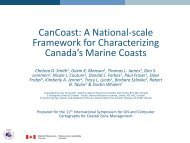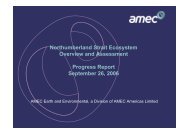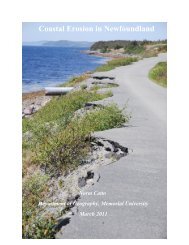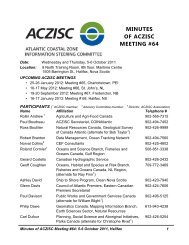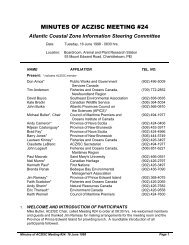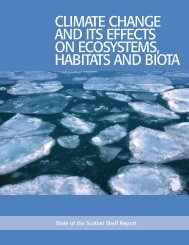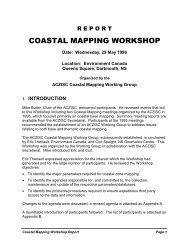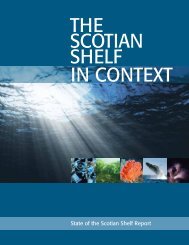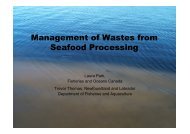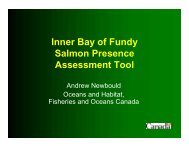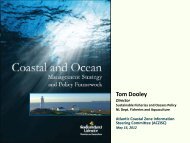Download PDF - COINAtlantic
Download PDF - COINAtlantic
Download PDF - COINAtlantic
- No tags were found...
Create successful ePaper yourself
Turn your PDF publications into a flip-book with our unique Google optimized e-Paper software.
<strong>COINAtlantic</strong>: Sharing through open tools and open standardsJeff McKenna 1 , Andrew Sherin 2 , Alexi Baccardax Westcott 2 & Paul Boudreau 31 Gateway Geomatics, Lunenburg, NS, Canadajmckenna@gatewaygeomatics.com2 Atlantic Coastal Zone Information Steering Committee Secretariata.sherin@dal.ca,aczisc@dal.ca3 International Ocean Institute Canadapboudreau@dal.caAbstractCoastal mapping and related decision makers often need to leverage geospatial information from many differentsources and many different regions all around the world. Current economic realities also prevent many coastal decisionmakers from investing in purchasing high cost datasets and licenses to share and publish this information. TheOpen Geospatial Consortium and the Open Source Geospatial Foundation are supporting standards and software thatallow organizations to easily share their spatial information. Popular Internet search engines such as Google are nowalso able to find datasets through these open standards. The Atlantic Coastal Zone Information Steering Committeeare producing tools consistent with its “Chain for Information Access” philosophy to help coastal decision makersleverage these open standards and open software.IntroductionOrganizations all across the world are producing their own coastal information, and outside organizations mustattempt to leverage this external data. Often difficulties exist in knowing what coastal information exists for a specificarea; for example, a region may have an enormous amount of coastal data but external organizations from outsidethe region cannot find that rich dataset. High costs are often associated with purchasing datasets and licenses forsoftware to publish geospatial information. The Atlantic Coastal Zone Information Steering Committee has establishedthe Coastal and Ocean Information Network Atlantic (<strong>COINAtlantic</strong>), to allow coastal decision makers methodsto easily locate related oceans data with these previously mentioned challenges in mind.Open Standards and Open Source SoftwareIn order to allow organizations to share geospatial information easily today, there are two important groups thatwere formed in the last decade. The Open Geospatial Consortium, or the OGC, is an international group of morethan 420 companies, government agencies, research organizations, and universities whose common goal is to developstandards for sharing spatial information (OGC, 2011). These standards allow software developers to design theirproducts so that the software is interoperable with other software. The Open Source Geospatial Foundation, orOSGeo, was formed in 2006 to develop and promote open tools for sharing spatial information; the term “OpenSource” is used here to refer to software that shares its source code openly. OSGeo supports many software projectsincluding the development of metadata management software such as GeoNetwork, desktop software such as QuantumGIS,and Web mapping software such as OpenLayers.Google Inc.Since the release of its Maps and Earth products in 2005, Google has become a major player in the geospatialrealm. Google users are able to use the Internet to display location maps for regions across the globe. Google botsare also constantly crawling Web sites and domains, and adding the results to their powerful search database.120



